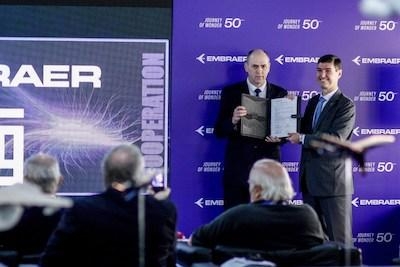Sign An Agreement To Jointly Develop New Technologies And Solutions
Embraer and WEG, two of Brazil's largest high-tech manufactured products exporters, announced today a scientific and technological cooperation agreement to jointly develop new technologies and solutions to enable electric propulsion in aircraft.

The partnership, in the context of pre-competitive research and development, seeks to accelerate the knowledge of the technologies necessary to increase the energy efficiency of aircraft from the use and integration of electric motors in innovative propulsion systems. The electrification process is part of a series of efforts carried out by the aeronautical industry aimed at ensuring its commitments to environmental sustainability, as is already being done with biofuels to reduce carbon emissions.
“By creating this technological development agreement with WEG, we have combined more than 100 years of innovation from two leading companies in generating knowledge and strengthening the supply chain, as well as increasing Brazilian competitiveness in the global market,” said Daniel Moczydlower, Executive Vice President of Engineering and Technology at Embraer. “Advances in scientific research can make clean and renewable energy a major enabler of a new era of urban and regional air mobility that is more accessible to the population.”
The cooperation between the research teams will support the creation of innovative technologies that can generate opportunities for future evolutions of new aeronautical configurations and the possibility of developing new market segments. Initiatives like this, combined with long-term incentive policies, also enhance Brazil's intent to become a world leader in sustainable technologies.
“Our powertrain technology, developed over years for tried and tested applications in trains, buses, trucks and boats, and in constant evolution, has paved the way for this exciting scientific and technological cooperation project. Together with Embraer we will work not only to enable the electric propulsion of aircraft, but also to increase the technological capacity of WEG, of Embraer and of Brazil, taking our country to an even more competitive level,” says Manfred Peter Johann, Superintendent Director of WEG Automation.
After testing these technologies in the laboratory, an aeronautical platform will be used for integration and testing of complex systems under real operating conditions. A small single-engine aircraft, based on the EMB-203 Ipanema, will be used as the test bed, which will carry out the primary evaluation of the electrification technology. The first flight of the electric powered demonstrator is scheduled for 2020.
The proposed scientific development of aeronautical electrification, using a technology demonstration platform, constitutes an effective and efficient pre-competitive research instrument for learning and training, as well as for the maturation of the technologies before they are applied in future products.
Embraer is committed to the open innovation model and maintains collaborations with dozens of universities and research centers in Brazil and abroad. Among the highlights are long-term partnerships with institutions such as FINEP, FAPESC, FAPESP, FAPEMIG and Embrapii, which are key to narrowing the gap between the scientific community and industry needs. By establishing strategic partnerships through more agile cooperation mechanisms, Embraer is stimulating knowledge networks to allow a significant increase in the country's competitiveness and the construction of a sustainable future.
(Image provided with Embraer news release)
 ANN's Daily Aero-Term (05.09.24): Hold Procedure
ANN's Daily Aero-Term (05.09.24): Hold Procedure ANN's Daily Aero-Term (05.06.24): Altitude Readout
ANN's Daily Aero-Term (05.06.24): Altitude Readout ANN's Daily Aero-Linx (05.06.24)
ANN's Daily Aero-Linx (05.06.24) Airborne-NextGen 05.07.24: AI-Piloted F-16, AgEagle, 1st 2 WorldView Sats
Airborne-NextGen 05.07.24: AI-Piloted F-16, AgEagle, 1st 2 WorldView Sats Aero-News: Quote of the Day (05.07.24)
Aero-News: Quote of the Day (05.07.24)



